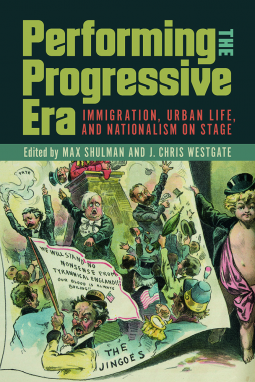
Performing the Progressive Era
Immigration, Urban Life, and Nationalism on Stage
by Max Shulman & J. Chris Westgate
This title was previously available on NetGalley and is now archived.
Send NetGalley books directly to your Kindle or Kindle app
1
To read on a Kindle or Kindle app, please add kindle@netgalley.com as an approved email address to receive files in your Amazon account. Click here for step-by-step instructions.
2
Also find your Kindle email address within your Amazon account, and enter it here.
Pub Date May 15 2019 | Archive Date May 31 2019
University of Iowa Press | University Of Iowa Press
Talking about this book? Use #PerformingTheProgressiveEra #NetGalley. More hashtag tips!
Description
Advance Praise
“The Progressive Era’s profound, unsettling, and contested change is treated here with sharp insight. Shulman and Westgate compellingly frame the complex varieties of performance during the period, and they further our understanding of the ways in which performance reflects and shapes culture and politics both at local and national levels.”—Christopher Herr, Missouri State University
“The Progressive Era is a rich historical period in which to investigate key cultural issues like urbanism, social reforms, reproductive rights, immigration, nationalism, sexuality, gender norms, and race relations. It is also a moment when American theatre artists were cutting the apron strings from Europe and fashioning nativist dramas and popular entertainments. This collection weaves these two important strands together, shedding light on U.S. culture during this vibrant time.”—Katie N. Johnson, author, Sisters in Sin: Brothel Drama in America, 1900–1920
Available Editions
| EDITION | Other Format |
| ISBN | 9781609386474 |
| PRICE | $90.00 (USD) |
| PAGES | 298 |
Average rating from 1 member
Featured Reviews
 Dee A, Reviewer
Dee A, Reviewer
This book contains so much useful and interesting information that it would be easy to write a full review on each of the chapters. Even in today’s world, the arts reflect current events, and the Progressive Era (1890 to 1920) is no exception. I chose to read this book with some trepidation, believing it might be more about lauding the Progressive Era. To their credit, the authors and editors maintained a steady course, targeting the issues that were addressed in performances.
The chapter essays (each on different subjects) were extremely accessible, capturing the essence of the times as it affected the slice of performance being addressed. I thoroughly enjoyed the opening chapters on the theater. Social mores are examined through the eyes of yesterday, and those who find Carroll O’Connor’s Archie Bunker offensive in today’s world will discover a veritable minefield of content in these plays. And no, I am not condemning them…history is history, and you can’t learn from it if it is ripped into tiny pieces and swept under the rug. That’s an Orwellian technique, one in which the authors steer clear of by exhibiting the good and the bad and relating it to the attitudes of that era. As essayist J. Chris Westgate points out, “…it is important to understand that these scenes elicited laughter rather than indignation from early-twentieth-century audiences.” However, as with Archie Bunker, the playwrights were not going for cheap laughs, but many times were making a point by lampooning the thoughts and actions of the populace.
Other chapters covered different areas, ranging from the scandalous nature of the Tango (it was inferred by some to be a “gateway” to further indecent behavior) to the attempts to keep children from the vaudevillian stage (imagine the world without Buster Keaton, who was involved in his parents’ act at three and began learning how to safely fall at the age of five).
The Progressive Era was a time of reform, and some of those attitudes did not match the realities of middle- and lower-class Americans. Artists seem to have a knack for capturing the prevailing mood of the country, and the struggles throughout those years were on display.
One may question the viewpoints of the individual authors. Do the essays capture the original intention of the playwrights, or are the plays viewed through the veils of today’s world, with many veiled layers of intervening years hampering interpretations? In the spirit of the book, I found myself walking in the world of the playwrights, where scathing commentary would walk the stages rather than troll their way through social media.
Overall, I found the book to be an entertaining way to experience history. Theatrical history is rich and contains much that most will miss. This is a book that should not be passed by. Five stars.
My thanks to NetGalley and The University of Iowa Press for a complimentary electronic version of this book.



